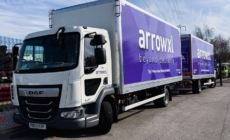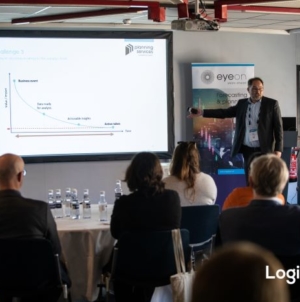-
ROSSLARE EUROPORT TARGETS HEALTH & SAFETY WITH CAMERA TELEMATICS PARTNERSHIP - 2 days ago
-
Landmark Study Reveals Wearable Robotics Significantly Boost Safety and Efficiency in Industrial Environments - July 24, 2024
-
Visku Tackle The Retail Seasonality Challenge One Pallet At A Time - July 22, 2024
-
KAMMAC AND BERGEN LOGISTICS STRENGTHEN FASHION & LIFESTYLE SERVICES IN THE UK - July 19, 2024
-
TENTBOX EXTENDS PARTNERSHIP WITH ARROWXL TO SUPPORT INCREASING DEMAND - July 17, 2024
-
The Perfume Shop improves customer journeys while driving profitability in partnership with Scurri - July 17, 2024
-
ZEROMISSION SECURES £2.3M ($3M) INVESTMENT TO ACCELERATE ELECTRIC FLEETS - July 16, 2024
-
BCMPA CELEBRATES SUCCESS OF 2024 CONFERENCE - July 15, 2024
-
Best of the Best: Jungheinrich Celebrates Triple International Award Win - July 12, 2024
-
GOPLASTICPALLETS.COM CALLS ON NEW CHANCELLOR RACHEL REEVES TO CONSIDER PLASTIC PACKAGING TAX REFORM - July 10, 2024
Outsourcing EDI management – a growing trend.
Having carried out a survey of 138 individual companies over the last year, we were immediately struck by a key finding: over 41% of businesses have no electronic data interchange (EDI) capability and 21% just use web portals.
That is a sizeable number of businesses that, by failing to adopt EDI, or not fully utilising its capabilities through integration with ERP systems, are exposing themselves to significant risk through increased errors and process inefficiencies. If businesses wish to engage with their customers and suppliers more effectively, with fewer errors and with reduced risk of expensive failures, then they must become part of a seamless supply chain using integrated EDI.
The survey revealed that the most popular types of messages exchanged were invoices (both inbound and outbound) and despatch notes (sometimes called advanced shipping notes or ASNs). Risk-free exchange of an operational message, such as an ASN, is critical – if it doesn’t get through, it’s a potential line-stopper, which leads to financial penalties and loss of business.
There are a number of possible reasons for the low adoption of EDI, which may include perceptions of cost, implementation complexity and ROI, as well as having the necessary staff. The good news is that these are all issues that can be addressed by outsourcing to a specialist EDI provider.
Managed service advantage
The survey suggests that outsourcing is surprisingly low – over 30% of EDI users do not use a value added network (VAN) and are, therefore, failing to reap the benefits from outsourcing the management of EDI.
There is, however, a growing trend towards outsourcing the management of EDI to a specialist, which frees a company to concentrate on its core competence. In addition to unveiling a hefty number of companies that can benefit from outsourcing, the survey found that 30% of respondents had multiple direct connections to VAN providers, while almost 40% of companies had a single, direct connection to a VAN provider.
The amount of multiple direct connections revealed by the survey indicates a shift to a more competitive market. The landscape is changing from the historical situation of each Tier 1 company supplying one OEM only, with its subsequent constraints down the supply chain. Suppliers are now working with multiple customers, and with more complex supply chain networks, rather than direct chains.
Choosing a EDI specialist or VAN provider is similar to selecting a web portal, in that the customer will point a company in the direction of their chosen provider. Companies may be using multiple VANs because individual customers suggested their own, preferred VAN – but this is not a prerequisite. Your chosen VAN should be able to connect you with whomever you wish. Data Interchange has interconnects already in place to deal with multiple preferred VANs, so traffic can be consolidated and economies of scale realised.
When not using their EDI capability, the survey found that these companies turn to emails and customer web portals in the main. The fact that fax comes next may come as a surprise, but business change can be difficult and many companies find comfort in familiarity – but this can mask underlying issues. Our job at Data Interchange is to show the ROI that can be achieved by supporting companies to review their processes.
EDI integration needed for ERP
The survey shows that 88% of EDI users have an ERP (Enterprise Resource Planning) system, a MRP (Materials Resource Planning) system or other planning system. The vast majority can import and export messages, which one would expect of a modern ERP. However, the survey divulges a small but significant number of companies that can’t. These companies tend to be hampered by legacy systems or a lack of operational knowledge in the organisation.
The survey also found that 64% of the companies who use a web portal have an ERP, MRP or planning system. Only approximately half of these can import and export messages. If the ERP system is capable of integration, which most are, why is there a reliance on portals? By failing to make the leap to full integration these companies are using a manual process to export from the portal and import into the ERP, which incurs greater risk and cost.
Companies that have invested in a fully-functional ERP system to gain significant benefit in terms of costs and integration should also have EDI. Without it, a company is adding complexity, cost and risk. For a small additional investment, Data Interchange can help a company realise the full potential of their ERP. www.datainterchange.com

































